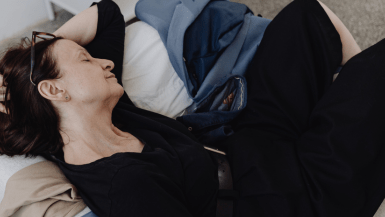The cost of caring: Understanding secondary traumatic stress in carers

Caring for someone living with brain injury is often described as a labour of love. It can be deeply meaningful, offering moments of connection, resilience, and hope. But caring can also take a significant toll. The ongoing responsibility, the emotional strain of supporting a loved one through recovery, and the uncertainty of the future can sometimes leave carers carrying more than they realise.
One of the lesser-known challenges many carers face is Secondary Traumatic Stress (STS), a condition that mirrors post-traumatic stress disorder but develops in those who support someone who has experienced trauma.
What is Secondary Traumatic Stress?
Secondary Traumatic Stress (STS) refers to the emotional distress that can arise from hearing about, witnessing, or supporting someone else’s trauma. For carers of people with brain injury, this may come from:
- Repeated exposure to stories about the injury or difficult experiences.
- Witnessing ongoing struggles with recovery.
- The stress of managing behavioural or emotional changes in their loved one.
Over time, the carer’s nervous system can begin to respond as though they themselves have experienced trauma.
Who is at risk?
While any carer can be affected, some factors increase the risk of STS:
- Close emotional connection: Carers supporting family members or partners are often most vulnerable.
- Duration of care: Long-term caring responsibilities can amplify stress.
- Limited support: Lack of respite, community support, or professional help increases pressure.
- Previous trauma: Carers with their own history of trauma may be more susceptible
Recognising the signs
STS can be hard to spot because carers often put their loved one’s needs first. But recognising the signs early is crucial. Symptoms may include:
- Emotional symptoms: Irritability, sadness, anxiety, guilt, or emotional numbness.
- Physical symptoms: Trouble sleeping, headaches, fatigue, or a weakened immune system.
- Behavioural changes: Withdrawal from friends, difficulty concentrating, or feeling overwhelmed.
- Intrusive experiences: Recurrent thoughts about the trauma or imagining worst-case scenarios.
What can help?
The good news is that STS is treatable, and with the right supports, carers can recover and sustain their wellbeing. Strategies include:
Professional support
- Counselling or therapy (especially trauma-informed approaches) can provide tools to manage stress.
- Peer support groups help carers feel less isolated and share coping strategies.
Self-care practices
- Prioritise rest, nutrition, and physical activity where possible.
- Schedule regular breaks and respite care to recharge.
- Engage in activities that bring joy and restore energy.
Building a support network
- Stay connected with family, friends, or community groups.
- Don’t hesitate to ask for practical help – whether it’s meals, childcare, or company.
Organisational support
At Synapse Australia, we understand the toll that brain injury can take not just on individuals, but on their families and carers. We provide information, support services, and advocacy to ensure carers are not carrying the load alone.
Visit Carers and family support | Australia’s brain injury organisation to explore the different support options we provide for carers.
At Synapse we have the following support group for carers:
Synapse Reconnections for Family, Friends, Carers (online) for more information visit: https://synapse.org.au/events
You can also connect on Facebook via our carers support group: Synapse Reconnections – Carers | Facebook
This Carers Week, we want to acknowledge the incredible resilience of carers across Australia. Your role is vital, and your wellbeing matters too. Recognising the cost of caring is not a sign of weakness, it’s the first step toward sustaining the strength and compassion that makes your care possible.
If you or someone you know is struggling, reach out. Support is available, and you do not have to walk this journey alone.
Support Services for Carers in Australia
- Carer Gateway – 1800 422 737 | carergateway.gov.au
- Synapse Australia – 1800 673 074 | synapse.org.au
- Lifeline – 13 11 14 | lifeline.org.au
- Beyond Blue – 1300 22 4636 | beyondblue.org.au
- SANE Australia – 1800 187 263 | sane.org
- Carers Australia – carersaustralia.com.au
- State Carers Associations – Each state/territory provides counselling and programs for carers:
- Carers NSW: 1800 242 636
- Carers Victoria: 1800 514 845
- Carers QLD: 1300 747 636
- Carers WA: 1300 227 377
- Carers SA: 1800 422 737
- Carers TAS: 1800 422 737
- Carers NT: 1800 422 737
- Carers ACT: 1800 422 737
Sources:
- Medical news Today.
A medical overview of STS how to recognise it, who is at risk, and pathways to care.
https://www.medicalnewstoday.com/articles/secondary-traumatic-stress
- Australian Institute of Family Studies (AIFS).
Provides Australian context on carer stress, resilience, and mental health risks.
- Beyond Blue – Resources on stress, trauma, and caring roles in Australia.